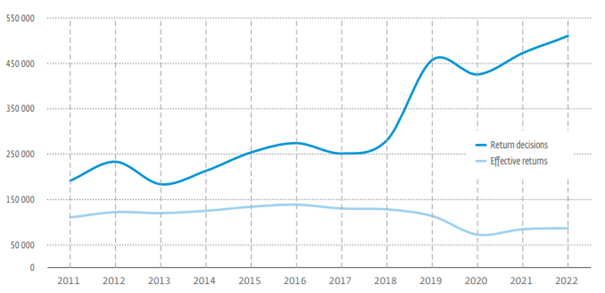Box 6. Return of former applicants

An effective and humane return of rejected asylum seekers is an integral part of a credible asylum system, as is the possibility to return to a country of origin voluntarily if an application for international protection is withdrawn. For the practical functioning of CEAS, returning a rejected asylum applicant effectively to the country of origin is essential or confidence in the system may collapse.
Return options include:
- Voluntary return and departure: when a person withdraws a claim and voluntarily returns to the country of origin or a person voluntarily complies with a return decision; and
- Forced return/removal: enforcement of the obligation to return through physical transportation out of a Member State. In many cases, returnees can benefit from return counselling prior to departure to prepare for the return. In addition, reintegration support in various forms is available after arrival to the country of return.
In many cases, returnees can benefit from return counselling prior to departure to prepare for the return. In addition, reintegration support in various forms is available after arrival to the country of return.
Key policy developments and publications
For many years, a key challenge in the area of returns has been the large discrepancy between negative asylum decisions and return decisions on the one hand and the implementation of a return on the other, as noted by Frontex in its Risk Analysis 2023/2024. This gap between decisions and effective returns seems to be widening.

Source: Frontex (2024). Annual Risk Analysis 2023/2024.
In January 2023, the European Commission published a policy document highlighting challenges and obstacles to an effective return system, such as lengthy administrative and judicial procedures and an insufficient level of cooperation with countries of origin. The European Commission emphasised the importance of a unified, comprehensive and effective EU system on returns and an efficient, streamlined process for their implementation. This was followed by a recommendation on the mutual recognition of return decisions to facilitate and expedite the return process.
FRA published its 2023 update of “Forced return monitoring across the EU”, in which it noted that some countries did not monitor any forced return operations, while others did so only partially. The report also points to issues related to the independence and transparency of national bodies which monitor forced returns. A key operational challenge concerns the lack of human resources and funding of national monitors.
In 2023, UNHCR issued positions on returns to Burkina Faso, Sudan, voluntary returns to Ukraine, and the voluntary return of Refugee Children without Parental Care, including Unaccompanied Children and Children Evacuated from Care Institutions in Ukraine.
The ENS reiterated the importance of having mechanisms in place to identify statelessness in the context of return procedures in order to safeguard against the arbitrary detention of stateless people and to refer them from return proceedings to statelessness determination procedures.1135
Developments at the national level
In 2023, initiatives to support voluntary returns were developed or implemented in Austria,1136 Bulgaria,1137 Finland,1138 Iceland1139 and Norway.1140
In Germany, the federal government adopted a draft law to improve the return procedure through more and faster returns of people with no right to stay in Germany.1141Romania amended, and Bulgaria is in the process of amending, their legislation to allow for a return decision to be issued together with a negative decision on international protection, a measure aimed to render the return process more efficient.1142
In June 2023, Croatia signed a memorandum of understanding with Frontex for the deployment of experts in the country to provide technical assistance in identification and operational assistance in the implementation of voluntary and forced returns.1143 Based on this memorandum, return counsellors were deployed to provide guidance to third-country nationals from countries covered by the EU Reintegration Programme. The SMA in Sweden established five special accommodation places for people who have received an enforceable decision on rejection, deportation or transfer to another country.1144
In an example of regional cooperation, Nordic ministers responsible for migration agreed on three joint initiatives to cooperate more closely in the area of migration and returns. The proposals concern joint reintegration projects in third countries, joint Nordic return operations in collaboration with Frontex, and collaboration with the IOM on the return of migrants stranded in North Africa.1145
Indicative jurisprudence on returns beyond CJEU
European Court of Human Rights [ECtHR], A.M.A. v The Netherlands: The ECtHR found a violation of Article 3 of the ECHR due to the failure of the Dutch authorities to adequately assess in a last-minute asylum application the risk of inhuman or degrading treatment in case of a return to Bahrain.
European Court of Human Rights [ECtHR], A.A. v Sweden: The ECtHR found no violation of Articles 2 and 3 of the ECHR concerning the return of a Libyan applicant whose asylum claim was rejected.
Germany, Higher Administrative Courts (Oberverwaltungsgerichte/Verwaltungsgerichtshof), Applicant v Federal Republic of Germany: The Higher Administrative Court of Mecklenburg-Western Pomerania ruled on the removal of an Afghan national as not being contrary to Article 3 of the ECHR.
Iceland, Immigration Appeals Board (Kærunefnd útlendingamála), Applicants v Directorate of Immigration: The Immigration Appeals Board ruled that rejected applicants should be given a period of time for a voluntary return before their removal, in line with the latest amendments to the Border Act.

Latvia, District Administrative Court [Administratīvā rajona tiesa], Applicant v Office of Citizenship and Migration Affairs: The court annulled an expulsion order for a homosexual applicant from Iran whose second subsequent application was accepted for examination in substance.
Best interests of the child
Austria, Supreme Administrative Court [Verwaltungsgerichtshof - VwGH], Applicants v Austrian Federal Office for Immigration and Asylum (BFA): The Supreme Administrative Court decided that the best interests of a child must be considered as part of a return decision and children could be heard in proceedings for the purpose of taking evidence, but not merely for the purpose of obtaining their opinion.
Germany, Administrative Court [Verwaltungsgericht], Applicant v Federal Republic of Germany: The Administrative Court of Augsburg granted urgent legal protection against a rejection of a subsequent application and a threat of deportation on grounds related to the best interests of the child.
Latvia, District Administrative Court [Administratīvā rajona tiesa], A v Office of Citizenship and Migration Affairs of the Republic of Latvia: The District Administrative Court upheld a Nigerian woman's appeal against an expulsion decision, citing the applicant's separation from her son as a violation of Article 3 of the ECHR, Article 3 of the Convention on the Rights of the Child and Article 5 of the Return Directive.
Right to private and family life
Austria, Supreme Administrative Court [Verwaltungsgerichtshof - VwGH], Applicant v Federal Office for Immigration and Asylum (BFA): The Supreme Administrative Court overruled a decision of the lower court on grounds that it failed to fully examine a potential violation of the right to private and family life for the applicant and her disabled husband by not holding an oral hearing.
Austria, Supreme Administrative Court [Verwaltungsgerichtshof - VwGH], Applicant v Federal Office for Immigration and Asylum (BFA): The Supreme Administrative Court decided that public interest in a return decision had to be balanced with the right to private and family life.
Austria, Supreme Administrative Court [Verwaltungsgerichtshof - VwGH], Federal Office for Immigration and Asylum (BFA) v Applicant: The Supreme Administrative Court decided that the Federal Administrative Court had deviated from the established case law of the Supreme Administrative Court on balancing interests in return decisions, pursuant to Article 8 of the ECHR.
Finland, Supreme Administrative Court [Korkein hallinto-oikeus], Applicant v Finnish Immigration Service (Maahanmuuttovirasto): The Supreme Administrative Court stated that a pending application for international protection does not have an impact on an entry and return decision since the FIS had already made a thorough assessment of refoulement.
For recent jurisprudence on non-refoulement, see Box 3.
For more jurisprudence on asylum see the EUAA Caselaw Database.
- 1135European Network on Statelessness (ENS). Input to the Asylum Report 2024.
- 1136The Federal Office for Immigration and Asylum (BFA). (2023, October 3). Sonderaktion für unterstützte freiwillige Rückkehr in den Irak.
- 1137European Commission. (18 October 2023). Press release: Commission reports on progress made by Bulgaria and Romania on the Pilot Projects for Fast Asylum and Return Procedures.
- 1138Finland, Ministry of the Interior | Sisäministeriö. (2023, August 28). Ministry of the Interior to prepare a new Decree on Assistance for Voluntary Return. https://intermin.fi/-/sisaministerio-valmistelee-asetusta-vapaaehtoisen-paluun-avustuksesta?languageId=en_US
- 1139Directorate of Immigration. (2023, June 23). Regulation on financial assistance for voluntary return.
- 1140The Norwegian Directorate for Immigration (UDI) | Utlendingsdirektoratet. (2023, November 2) Tilskudd til informasjonstiltak om assistert retur [Subsidy for information measures on assisted return].
- 1141Federal Ministry of the Interior. (2023, October 25). Neue Regelungen für mehr und schnellere Rückführungen [New regulations for faster returns]. https://www.bmi.bund.de/SharedDocs/kurzmeldungen/DE/2023/10/rueckfuehrungsverbesserungsgesetz.html
- 1142European Commission. (2023, October 18). Commission reports on progress made by Bulgaria and Romania on the Pilot Projects for Fast Asylum and Return Procedures. https://ec.europa.eu/commission/presscorner/detail/en/ip_23_5063
- 1143Ministry of the Interior. (2023, July 13). Vice President Božinović presented the Memorandum of Understanding in the field of returns between the Republic of Croatia and Frontex. https://mup.gov.hr/vijesti/potpredsjednik-bozinovic-predstavio-memorandum-o-razumijevanju-u-podrucju-vracanja-izmedju-republike-hrvatske-i-frontex-a/290504
- 1144Swedish Migration Agency | Migrationsverket. (17 October 2023). Migrationsverket startar återvändandecenter [The Swedish Migration Agency starts return centers]. https://www.migrationsverket.se/Om-Migrationsverket/Pressrum/Nyhetsarkiv/Nyhetsarkiv-2023/2023-10-17-Migrationsverket-startar-atervandandecenter.html
- 1145Ministry of Justice and Public Security | Justis- og beredskapsdepartementet. (2023, November 1). De nordiske landene enige om felles initiativ om reintegrering og retur [The Nordic countries agree on a joint initiative on reintegration and return].

